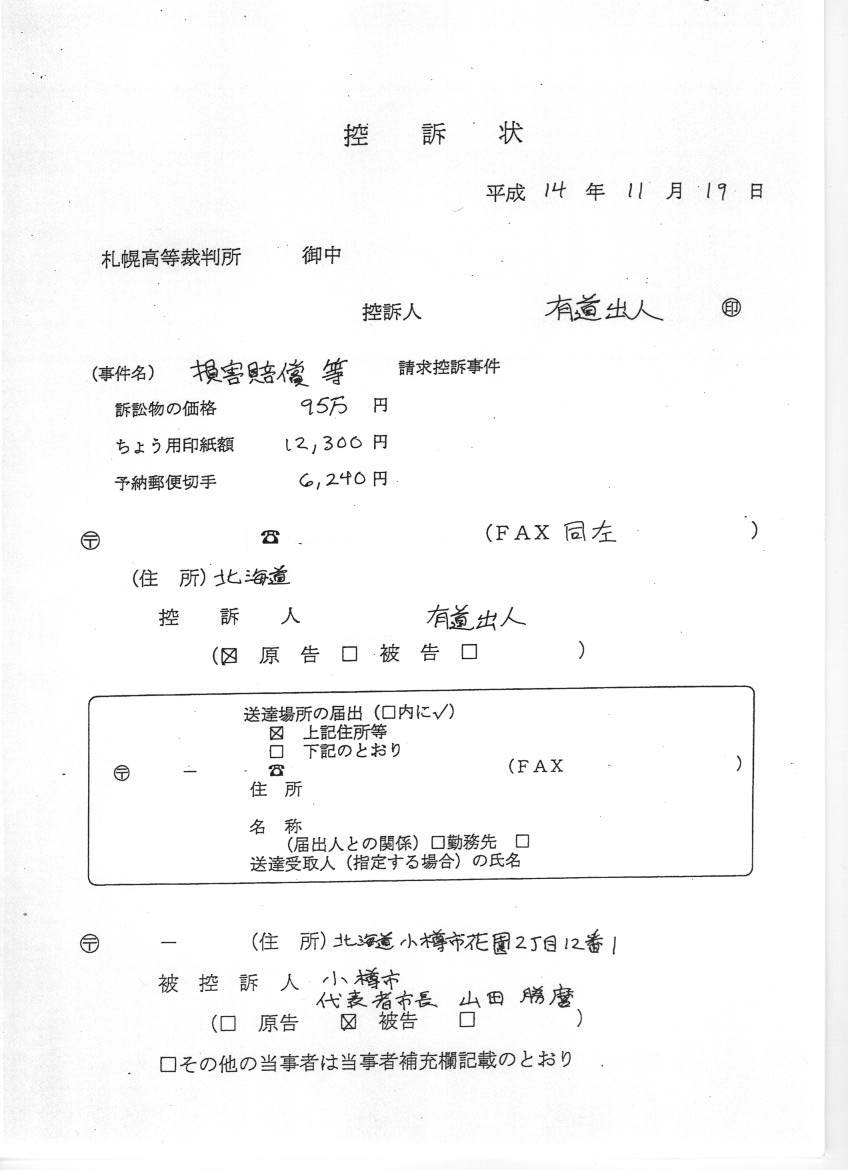

THE OTARU ONSEN LAWSUIT
小樽温泉訴訟
2つの控訴:原告有道 出人、被告温泉「湯の花」
UPDATE NOV 23 - DEC 4, 2002
BOTH SIDES APPEAL
原告有道 出人の控訴の詳細、理由はここです
Hello All. Page down to English:
ところが、被告温泉「湯の花」も原告らを相手取り控訴しました。しかも、「強制執行停止」を取得し、控訴が終了するまで命令された賠償を原告らに支払わなくてもいいようになりました。結果は、もう一人の原告、オラフ カートハウスは以前発表した通り、全ての賠償金をEWM孤児院(インドのマドラスにて460人以上の孤児に住居、食事、教育を与えている)、全国心臓病の子供を守る会札幌支部、と難病連 新難病センターに寄付するですが、中止となりました。
それに原告有道 出人が控訴に捧げる賠償金は凍結となりました。ですから控訴のため、皆様にやむを得ず頭を下げてカンパさせていただきたいと思います。私たちは個人ですが、温泉「湯の花」は大きな会社であり、小樽の一番大きな温泉です。最近なおさら大きくなりました。この裁判でも有名となり「手宮殿」の開店およそ4年後別館の「朝理殿」も開店できるまで儲けられているようです(http://www.yunohana.org)。入浴施設は客商売だから、湯の花さんが頑張って成長してほしいですが、控訴で相手取らなかった原告らを相手取って控訴し、しかも「強制執行停止」までするのなら、どれくらい自分の行為を反省して、裁判官に「人種差別行為・違法行為である」と判断されたものの、外国人または外見で外国人みたいな日本人客に対しどれくらい社会的に深刻な問題(即ち「外国人お断り」の普及の助長)を起したのかは認識しているでしょうか。湯の花さんは未だに「日本語ができない外国人」をお断りしています。
要するに、私は原告一人として国籍・外見を問わず皆様が住みやすい日本社会を裁判でも頑張って助長したいと思います。国連の条約を守り差別を撤廃する行政官・立法府・司法官が我が国で必要であると思います。納得していただいてカンパは可能であればお願い致します。再び勝訴となり強制執行停止がなければ献金者に全額お返しします。振込先と控訴に関する費用明細・領収書などはここです。
これからも皆様のサポートも宜しくお願い致します。有道 出人
1. EWM orphanage, which provides shelter, food and education for more than 460 children in Madras, India
2. The support group for children with heart defects (zenkoku shinzobyou no kodomo wo mamoru kai) in Sapporo, Japan
3. The support group for people with incurable diseases (Nan byou ren) in Sapporo, Japan
Since Yunohana decided to appeal the court decision and
file a court order, the prospective receivers of the donations will have to wait
until the appeal court decision.
It is very unfortunate that Yunohana asked for and obtained this court order to exempt
them from provisionally giving me my part of the compensation in advance, as was
stated in the court verdict.
It is very regrettable that due to these actions of Yunohana my wish to help children
who are desperately in need cannot be fulfilled to the extent that I intended.
ENDS
1) DOES THE OWNER HAVE THE RIGHT TO CHOOSE ITS CLIENTELE? Yes it does. It depends on the criteria. "No shoes, no shirt, no tie, no service" is one thing, since people can chose to put on those clothes and thus qualify to enter. However, for a public place (specifically one entrusted by Japanese law to carry out a "necessary and essential" service of public hygiene) to refuse people by their skin color or apparent nationality employs criteria that are not a matter of individual choice--one cannot simply put on a different skin and enter. Nor is this criteria germane to the selection process, since race or nationality have nothing to do with the individual customer's choice of following a bathhouse's rules.
2) ISN'T THIS AN OVERREACTION TOWARDS A MOM-AND-POP TYPE OF ONSEN? It is not a mom-and-pop onsen. Yunohana Onsen is actually Otaru's biggest bathhouse. And it has gotten bigger. In the four years since it opened, Yunohana has made enough money (notwithstanding the free publicity from this case) to open a second bathhouse in Asari (see for yourself at http://www.yunohana.org). Bravo for it's ability to make a living, but when it goes so far as to not only 1) ignore a court decision that its behavior was both "racially discriminatory" and "illegal", but also 2) demand a court order to avoid paying court-awarded damages, it makes one wonder just how deeply Yunohana has considered their position as a provider of a social service and public good to customers, any customers. Even now, Yunohana still refuses foreign-looking customers who do not speak Japanese.
If you can agree that this case involves a social problem that cannot remain untouched,
and that the Japanese government is in fact responsible for following international
treaty and for legally resolving issues of discrimination within its jurisdictions,
please consider helping out. Even moral support, particularly in the public debate
arenas, will suffice.
Scanned copies of Yunohana's three-page court order are available
here.
The following pages are the exact copies of the Appeal Petition I submitted. Thanks
for reading this far.
Arudou Debito
Sapporo


以上